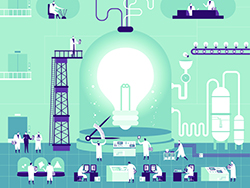 5G is a hot topic right now, after the UK government became embroiled in a row about the security risks of using the Chinese company Huawei to develop the country’s forthcoming 5G network. But what is 5G? and what difference will it make to our lives?
5G is a hot topic right now, after the UK government became embroiled in a row about the security risks of using the Chinese company Huawei to develop the country’s forthcoming 5G network. But what is 5G? and what difference will it make to our lives?
5G is short for fifth generation cellular network; it follows on from the previous four generations that have been introduced since the 1980s. 1G was analogue; 2G was the first system to offer data services such as text messages; 3G brought in mobile internet access and video calls; and 4G ushered in mobile web access, high-definition TV services, video conferencing and more.
And just like these earlier advances, 5G will be much faster than previous generations, with forecast download speeds starting at 1 gigabyte per second (Gb/s) in 2020 and rising as high as 20Gb/s. That means that instead of streaming films, you should be able to download an entire film in less than a minute.
Low latency
The other big difference with 5G is that it will have extremely low ‘latency’ – the amount of time it takes to get a response when data is sent. Latency is likely to plunge from 50 milliseconds on a 4G phone to just 1 millisecond on 5G.
So far, a number of applications are set to benefit from the dramatically increased speed at which 5G will operate. One is self-driving cars. Each vehicle will be fitted with hundreds of sensors that monitor the roadside, traffic signals and other vehicles, but also collect data from traffic systems and especially from other vehicles, telling them about accidents and other hazards. The concept is known as ‘Vehicle to everything’ or V2X.
The Internet of Things (IoT) is also set to take off with 5G, since it will enable appliances such as your fridge or air conditioning to constantly send and receive signals that will control their operation.
Meanwhile, in the financial sector, 5G will also have a significant impact – though it may not be quite as clear cut as in other areas. UK 5G expert Jamie Carter recently wrote that 5G will change ‘how we spend, how we save and how we buy financial services’.
Writing on 5G.co.uk, Carter says that in financial services, the improved latency – or speed of response – will be more important than increased download speeds. ‘At the very least, 5G will bring a lightning-fast real-time user experience to mobile devices, so that consumers will experience instant banking and payment transactions on their device,’ Carter writes.
He also believes that payment technology will surge on the back of wearables powered by IoT. You’ll be able to pay for services from watches or even smart eye-glasses, with a concomitant step up in security procedures such as iris technology, also facilitated by 5G.
Faster trades
Stock market trading is also poised to benefit from 5G technology. ‘Speedy buying and selling is everything in the stock exchange, and fractions of seconds can make huge differences worth millions of dollars a year,’ writes Carter. Stockbrokers are likely be among the first to install 5G microwave radio links, to take advantage of almost instantaneous response.
5G could also give a big boost to micro-payments – whereby you pay multiple tiny amounts according to your exact usage for services such as car parking, web usage or wifi services.
Some believe that 5G will also be used to enhance customer services. According to AT&T, which is at the forefront of developing the US network, ‘One example of a technology that could be powered by 5G is the remote teller. This service would enable customers to get personalised attention via a video session without necessarily finding and travelling to their nearest branch. Teller services could potentially become available wherever the 5G network exists, either on smartphones or via personalised ATMs.’
5G may pave the way for artificial intelligence-based personal banking services, says the telecommunications company. For example, real-time gathering of a user’s behavioural data creates the opportunity for an adviser to deliver context-aware financial recommendations. Look out for the use of virtual reality in bank branches and even pop-up virtual branches in remote locations.
One thing is clear: the future of banking – and other financial services – will take place largely and increasingly on mobile devices. 5G is set to accelerate that revolution.